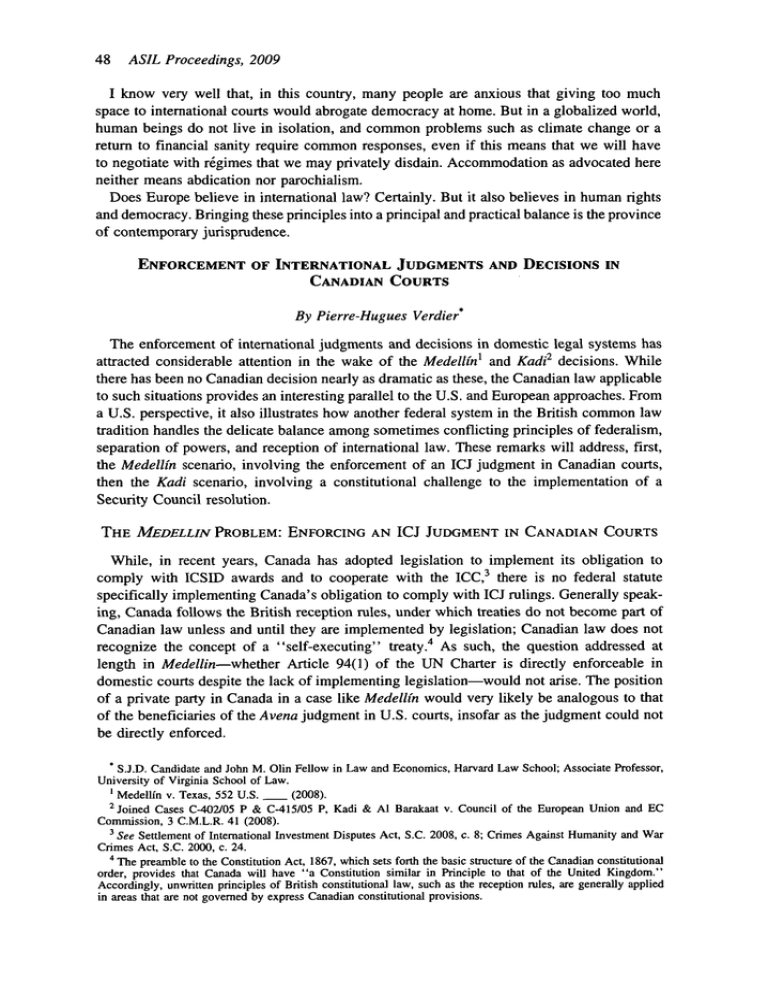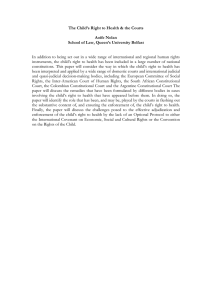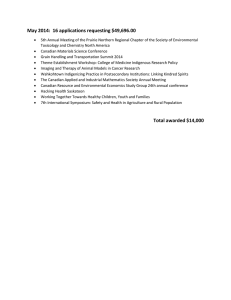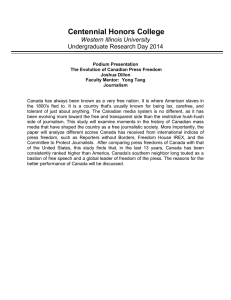48 2009 I space to international courts would abrogate ...
advertisement

48 ASIL Proceedings, 2009 I know very well that, in this country, many people are anxious that giving too much space to international courts would abrogate democracy at home. But in a globalized world, human beings do not live in isolation, and common problems such as climate change or a return to financial sanity require common responses, even if this means that we will have to negotiate with r6gimes that we may privately disdain. Accommodation as advocated here neither means abdication nor parochialism. Does Europe believe in international law? Certainly. But it also believes in human rights and democracy. Bringing these principles into a principal and practical balance is the province of contemporary jurisprudence. ENFORCEMENT OF INTERNATIONAL JUDGMENTS AND DECISIONS IN CANADIAN COURTS By Pierre-HuguesVerdier* The enforcement of international judgments and decisions in domestic legal systems has attracted considerable attention in the wake of the Medellin' and Kadi2 decisions. While there has been no Canadian decision nearly as dramatic as these, the Canadian law applicable to such situations provides an interesting parallel to the U.S. and European approaches. From a U.S. perspective, it also illustrates how another federal system in the British common law tradition handles the delicate balance among sometimes conflicting principles of federalism, separation of powers, and reception of international law. These remarks will address, first, the Medellin scenario, involving the enforcement of an ICJ judgment in Canadian courts, then the Kadi scenario, involving a constitutional challenge to the implementation of a Security Council resolution. THE MEDELLIN PROBLEM: ENFORCING AN ICJ JUDGMENT IN CANADIAN COURTS While, in recent years, Canada has adopted legislation to implement its obligation to comply with ICSID awards and to cooperate with the ICC,3 there is no federal statute specifically implementing Canada's obligation to comply with ICJ rulings. Generally speaking, Canada follows the British reception rules, under which treaties do not become part of Canadian law unless and until they are implemented by legislation; Canadian law does not recognize the concept of a "self-executing" treaty.4 As such, the question addressed at length in Medellin-whether Article 94(1) of the UN Charter is directly enforceable in domestic courts despite the lack of implementing legislation-would not arise. The position of a private party in Canada in a case like Medellin would very likely be analogous to that of the beneficiaries of the Avena judgment in U.S. courts, insofar as the judgment could not be directly enforced. * S.J.D. Candidate and John M. Olin Fellow in Law and Economics, Harvard Law School; Associate Professor, University of Virginia School of Law. 1Medellin v. Texas, 552 U.S. 2 _ (2008). Joined Cases C-402/05 P & C-415/05 P, Kadi & Al Barakaat v. Council of the European Union and EC Commission, 3 C.M.L.R. 41 (2008). See Settlement of International Investment Disputes Act, S.C. 2008, c. 8; Crimes Against Humanity and War Crimes Act, S.C. 2000, c. 24. 4 The preamble to the Constitution Act, 1867, which sets forth the basic structure of the Canadian constitutional order, provides that Canada will have "a Constitution similar in Principle to that of the United Kingdom." Accordingly, unwritten principles of British constitutional law, such as the reception rules, are generally applied in areas that are not governed by express Canadian constitutional provisions. A Comparative Look at Domestic Enforcement of InternationalDecisions 49 While there is no Canadian case specifically addressing the enforceability of ICJ judgments, domestic courts have addressed requests by individual litigants to enforce international decisions. Thus, in Ahani, an alien facing deportation to Iran on national security grounds asked that the proceedings be suspended pending the outcome of an individual complaint to the UN Human Rights Committee. 5 The Committee had specifically requested suspension of the Canadian proceedings as a provisional measure. The Ontario Court of Appeal held that provisional measures requested by the Committee were unenforceable in the absence of implementing legislation. Therefore, it refused to suspend the deportation proceedings until the Committee heard the case. The Supreme Court denied leave to appeal. Ahani clearly 6 supports the notion that international judgments are unenforceable in Canadian courts. Another aspect of Medellin that has a close parallel in Canada is the federalism issue. If anything, the obstacles to enforcement of international judgments in Canada on federalism grounds are greater than in the United States. The federal executive has the authority to enter into treaties without any involvement of the legislative branches, thus creating international obligations.7 However, the federal Parliament does not have specific legislative authority to adopt laws implementing treaties.8 Instead, treaties must be implemented by Parliament and 9 the provincial legislatures acting under their respective constitutional powers. This is why, as a practical matter, the treaty-making process in Canada requires substantial provincial involvement to ensure that implementing legislation is passed. This is particularly true in commercial and trade matters, which often fall within provincial jurisdiction. Because of this doctrine, if the measures required to comply with an ICJ judgment fell within the constitutional authority of the provinces, the federal government very likely could not adopt 10 legislation to implement these measures or otherwise compel the provinces to comply. There is, however, one important caveat to the rule that ICJ decisions are generally unenforceable in Canadian courts. In many instances, international decisions have been taken into consideration by Canadian courts in indirect ways. First, and least surprisingly, international judgments have been cited on several occasions by the Supreme Court as Ahani v. Canada (Attorney General), [20021 O.J. No. 431, 58 O.R. (3d) 107 (Ont. C.A.). 6 The Court of Appeal, however, also held in obiter that there was an alternative reason not to enforce the request for provisional measures, namely that the ICCPR does not create an international law obligation to comply with such measures. Therefore, there is a possibility that Ahani might be distinguished in the context of enforcing an ICJ judgment, on the ground that there is a clear international obligation to comply with the latter under Article 94(1). This reasoning would also apply to provisional measures "indicated" by the ICJ under Art. 41 of its Statute, given the Court's holding in LaGrand (Germany v. U.S.), Judgment, 2001 ICJ REP. 466 (Jun. 27), that such provisional measures are binding as international law. Nevertheless, the Court's ratio decidendi clearly implies that international judgments are unenforceable absent implementing legislation. It should also be noted that following the ICJ's decision in Delimitation of the Maritime Boundary in the Gulf of Maine Area (Canada v. U.S.), Judgment, 1984 ICJ REP. 246 (Oct. 12), some Canadian courts appear to have taken for granted that the delimitation established by the Court should be recognized for purposes of litigation involving private parties. The issue of enforceability does not appear to have been argued, and there was in any event no indication that the Canadian Government intended to depart from the Court's decision. These decisions therefore appear to have little bearing on the enforceability of ICJ judgments in Canada generally. The Canadian practice of seeking approval of important treaties by Parliament prior to ratification ended in the 1960s. In 2008, the Federal Government announced that it would henceforth table treaties in the House of Commons prior to ratification, but would not require approval. See GIB VAN ERT, USING INTERNATIONAL LAW INCANADIAN COURTS 94-98 (2d ed. 2008). 8 Section 132 of the Constitution Act, 1867, which empowers Parliament to perform Canada's obligations "arising under Treaties between the Empire and ... Foreign Countries," has been held not to apply to treaties entered into by Canada since it acquired autonomy from the British Empire in foreign affairs. 9 See Labour Conventions Case (Attorney-General for Canada v. Attorney-General for Ontario), [1937] A.C. 326 (P.C.). 10 It should be noted, however, that federalism would not be a significant obstacle in a case like Medellin, because criminal law and procedure are specifically within federal jurisdiction. See Constitution Act, 1867, s. 91(27). 50 ASIL Proceedings,2009 persuasive authority on questions of international law." This use of international judgments as evidence of customary international law or of the subsequent practice of the parties relating to a treaty clearly does not imply direct enforcement. In a more striking development, however, the Supreme Court has developed a very robust version of the presumption of conformity with international law.12 The presumption has been used not only to guide interpretation of domestic legislation, but also to review the legality of exercises of regulatory power and discretionary action by Canadian officials. 3 It has also been applied to provisions of the Canadian Charter,14 including the "principles of fundamental justice" protected under Section 7.15 This case law opens the door to various arguments that might achieve some degree of judicial enforcement of an international judgment binding on Canada. For instance, to the extent that Canadian officials possess discretionary authority under existing law to take measures that would achieve compliance, one could argue that the presumption of conformity compels them to act in accordance with the country's unimplemented international obligations-or at least duly to consider such obligations as part of their decision-making process. Alternatively, a party could argue that noncompliance with the outcome of an international adjudication to which Canada has consented and that affects her rights violates the "principles of fundamental justice" of Section 7 of the Charter.In Ahani, the Ontario Court of Appeal rejected the argument that Canada's purported obligation to comply with provisional measures should be read into Section 7. Nevertheless, the British Privy Council invoked that reasoning in a number of appeals from Caribbean jurisdictions with constitutional provisions similar to Section 7.16 While these decisions are not controlling in Canada and were expressly distinguished by the Ontario Court of Appeal in Ahani, it remains possible that such an argument might be invoked to secure compliance with an ICJ judgment in a case like Medellin. THE KADI PROBLEM: CHALLENGING A SECURITY COUNCIL IMPLEMENTATION MEASURE ON CONSTITUTIONAL GROUNDS A Canadian federal statute, the United Nations Act,' 7 authorizes the federal executive to make regulations to implement measures adopted by the Security Council under Article ' See, e.g., Mugesera v. Canada (Minister of Citizenship and Immigration), [2005] 2 S.C.R. 100 (drawing on ICTY and ICTR case law to define crimes against humanity). 12For discussion of the presumption of conformity in Canadian law, see R. v. Hape, [2007] 2 S.C.R. 292, 1I 53-56; VAN ERT, supra note 7, ch. 5. 13See, e.g., Baker v. Canada (Minister of Citizenship and Immigration), [1999] 2 S.C.R. 817 (pursuant to the presumption of conformity, Canada's obligations under the-ratified but unimplemented-Convention on the Rights of the Child are relevant to judicial review of the reasonableness of a discretionary asylum decision); 114957 Canada Lt6e (Spraytech, Soci6t6 d'arrosage) v. Hudson (Town), [20011 2 S.C.R. 241 (legality of municipal pesticide control regulation is supported, in part, by its consistency with the "precautionary principle" incorporated in international environmental instruments). 14 See, e.g., Hape, 2 S.C.R. 817, (N 55-56 ("Whenever possible, [this Court] has sought to ensure consistency between its interpretation of the Charter, on the one hand, and Canada's international obligations and the relevant principles of international law, on the other. ... In interpreting the scope of application of the Charter, the courts should seek to ensure compliance with Canada's binding obligations under international law where the express words are capable of supporting such a construction."). 15See, e.g., United States v. Burns, [2001] 1 S.C.R. 283; Suresh v. Canada (Minister of Citizenship and Immigration), [2002] 1 S.C.R. 3 (drawing on international law to support holdings that deportation without assurances to potential death penalty or torture violates Section 7). 1 See Thomas v. Baptiste, [2000] 2 A.C. 1, [1999] 3 W.L.R. 249 (P.C.); Higgs v. Minister of National Security, [2000] 2 A.C. 228, [2000] 2 W.L.R. 1368 (P.C.); Briggs v. Baptiste, [2000] 2 A.C. 40 (J.C.P.C.); Lewis v. Jamaica (A.-G.), [2001] 2 A.C. 50, [2000] 3 W.L.R. 1785 (P.C.). 17R.S.C., 1985, c. U-2. A ComparativeLook at Domestic Enforcement of InternationalDecisions 51 41 of the UN Charter. The Government relied on this authorization to adopt regulations implementing Resolution 1267 in 1999 and Resolution 1373 in 2001. When initially passed, the 1267 regulation incorporated by reference the Security Council's list of designated entities. It was modified in 2006 so that the list is now independently adopted by the executive. Of course, Canada remains obligated by Resolution 1267 itself to apply the relevant sanctions to persons and entities designated by the Comiittee. Could these regulations be challenged on constitutional rights grounds along the lines of Kadi? To my knowledge, no such challenge has been heard by Canadian courts. One was commenced but discontinued in 2002 after the individual was delisted by agreement of Canada and the United States. 19 A case pending before the Federal Court may also raise this question. 20 This being said, several legal ingredients of such a challenge are available: first, it is clear that actions taken to implement the sanctions are subject to judicial review. Second, many of the obstacles to such litigation that might apply in the United States-notably standing and the political question doctrine-have been substantially relaxed by the Supreme Court in recent years for constitutional cases. Notably, Canadian courts have been willing to become involved in constitutional review of matters involving foreign relations and national security. Three recent cases illustrate this trend. In Charkaoui,2 1 a 2007 case, the Supreme Court struck down provisions allowing the executive to deport permanent residents and foreign nationals on national security grounds because they did not provide for a proper adversarial hearing. Notably, the procedure provided for review by a federal judge, with secret evidence withheld from defendant's counsel. There is obviously an analogous argument to be made with respect to the Security Council's asset freeze listing procedures. In CanadianCouncil for Refugees, 22 also decided in 2007, the Federal Court struck down the regulations implementing the Safe Third Country Agreement with the United States. 23 The Agreement provided that refugees transiting through the U.S. would not be granted asylum in Canada but would be returned to the U.S. as a "safe third country." The legislation required that prior to designating a foreign country as "safe," the Government determine that the country complied with the UN Refugee Convention and the Convention Against Torture. Remarkably, the judge held that the Government's finding that the United States was in compliance with these treaties was unreasonable, 24 and also held that the Agreement violated Sections 7 and 15 of the Charter-the "principles of fundamental justice" and the right to equality.25 The case was recently reversed on appeal,26 but the appeal rested on administrative law grounds and did not address any of the findings regarding U.S. compliance See United Nations Al-Qaida and Taliban Regulations, SOR/99-444 (Nov. 10, 1999); Regulations Implementing the United Nations Resolutions on the Suppression of Terrorism, SOR/2001-360 (Oct. 2, 2001). 19See E. Alexandra Dosman, Forthe Record: Designating'Listed Entities'forthe Purposesof TerroristFinancing Offenses at Canadian Law, 62 U. TOR. FAc. L. REV. 1 (2004). 20 See Paul Koring, Cannon Adds New Hurdle to Canadian'sReturn, THE GLOBE & MAIL (Mar. 30, 2009). 21Charkaoui v. Canada (Citizenship and Immigration), [20071 1 S.C.R. 350. 22 Canadian Council for Refugees v. Canada, [20081 3 F.C.R. 606 (F.C.T.D.). 23Agreement between the Government of Canada and the Government of the United States of America for cooperation in the examination of refugee status claims from nationals of third countries (Dec. 5, 2002). 2 Based on (i) the combination of 1-year bar for asylum claim and higher standard for withholding of removal; (ii) categorical exclusions for terrorism and serious criminality; (iii) U.S. treatment of gender claims; and (iv) the corroboration and credibility requirements of the REAL ID Act. 25Section 7 because of the lack of discretion on the part of the immigration officer to consider specific circumstances; Section 15 because of disproportionate effects on certain categories of applicants (e.g., women because of U.S. treatment of gender claims.). 26 See Canada v. Canadian Council for Refugees, 2008 FCA 229. 52 ASIL Proceedings,2009 with these treaties. It also did not consider the constitutional questions because of the lack of a proper factual basis. Finally, in Council of Canadians,27 decided in 2008, the Federal Court upheld the constitutionality of NAFTA's Chapter 11 arbitration process. The challenge alleged that Chapter 11 encroached upon the inherent powers of superior courts, which are protected under the Constitution. The Court was willing to exercise some deference based on the idea that international tribunals have a different function than domestic courts. It should be noted that Charkaoui did not involve an international law obligation upon Canada to act in the way it did. On the other hand, a victory for the plaintiffs in Canadian Councilfor Refugees or Council of Canadians would likely have put Canada in breach of its international obligations, as would a challenge to the terrorist financing regulations. It is unclear to what extent Canadian courts would find it appropriate to defer to such obligations and the listing and review processes established by the Security Council in a case analogous to Kadi. CONCLUSION While ICJ judgments are formally unenforceable in Canadian courts, as they are in the United States after Medellin, the Supreme Court of Canada's recent case law on the presumption of conformity potentially opens the door to some degree of domestic enforcement of unimplemented international obligations. It remains to be seen, however, whether the Court would draw the line so far as to allow de facto judicial enforcement of an international judgment that is not directly enforceable for lack of implementing legislation. Canadian courts have historically been reluctant to carry the presumption that far, as it would undermine the implementation requirement and, since the executive has plenary power to ratify treaties and consent to international adjudication, the domestic separation of powers. By contrast, constitutional challenges to implementation of international decisions-like the Security Council regime at issue in Kadi-appears to be a real possibility within the Canadian legal order. THE ENFORCEMENT OF INTERNATIONAL DECISIONS IN U.S. COURTS By Ingrid Wuerth* The enforcement of international decisions in the domestic courts of the United States is best understood as a general matter by focusing on two broad issues: how the decision is to be enforced and pursuant to what authority. These two considerations allow us to understand the Supreme Court's decisions in Sanchez-Llamas and Medellin in the context of U.S. practice generally with respect to the enforcement of international decisions, and also to permit effective comparisons to similar decisions by domestic courts in Germany. Beginning with the first consideration-how decisions are enforced-an international decision could be given effect through the actual enforcement of the judgment itself, against or on behalf of parties to that judgment, or it might mean that the decision serves as binding precedent for the interpretation of international law in future cases. As a third alternative, an international decision could be less formally enforced by serving as a non-binding aid to the interpretation of international law in related or future cases. 27 See Council of Canadians v. Canada (Attorney General), [2006] O.J. No. 4751, 277 D.L.R. (4h) 527. *Professor, Vanderbilt University Law School.




